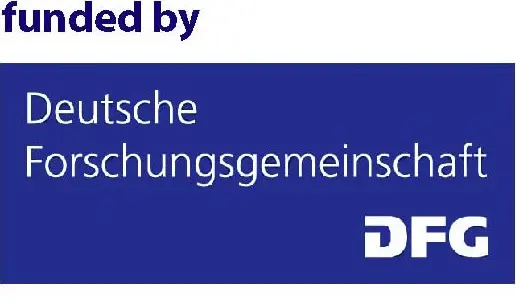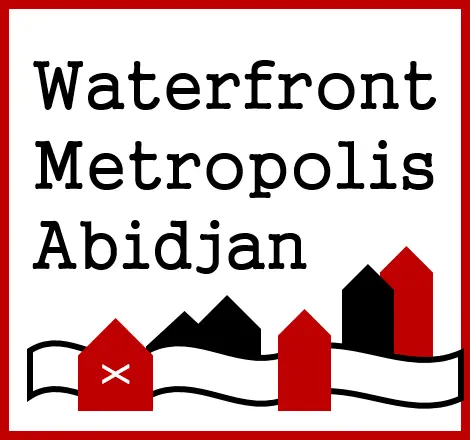Waterfront Metropolis Abidjan. Between everyday urbanity, spontaneous urbanisation, town planning and real estate development
- Keywords
-
anthropology of the city, informal settlements, informal rental markets, housing crisis, urbanisation, urban sustainability, social navigation
- Countries
-
Côte d´Ivoire
- Summary
-
Our research analyses social and political dynamics around waterfronts in Abidjan, and studies how affected residents organise and navigate through urban space and residential insecurity.
The spontaneous settlement Adjahui-Coubé is located on a central peninsula in Port Bouët Municipal District. It is managed under the rural land regime because it is originally a village of the Ebrié, the autochtonous population of the region. The settlement is associated to the municipality. There were already some plans to construct housing during the 1970s which were not realised. Since then the peninsula remained a white spot in urban planning until a few years ago, when the masterplan of an eco-airport city was developed under the leadership of the District of Abidjan.The settlement used to be a slowly growing village of mainly Ebrié fishermen surrounded by farms and forest until 2011, when settlers from Moussakro, a spontaneous settlement along the Airport Road, were evicted and took refuge in the peninsula.The rental market for poorer strata in Abidjan is tense and short supply in housing accelerates further by forceful evictions and destruction of existing housing. Prices for rental housing have increased and push people from poor and precarious quarters into super-precarious living conditions in Adjahui, where private investors started to build simple courtyards for tenants. Today, the population is numerous (around 60,000 inhabitants in mid 2018), dense and heterogeneous, consisting of people without financial means, as well as families who have lost their homes due to the evictions and demolishments. Many other people cannot afford security deposits and rents in other neighbourhoods either. Adjahui-Coubé has turned into an attractive settlement for low-paid workers from the industrial, service and transport sector, as well as for young adults searching for housing when starting a family.
The research follows three objectives: (1) to write an ethnography about the settlement Adjahui-Coubé, which has spontaneously expanded on a peninsular in the South of the metropolis after other spontaneous settlements had been evicted; (2) to contextualise the Adjahui-Coubé case by analysing the historical and political interplay of every day urbanism, unplanned urbanisation, town planning and real estate development in Abidjan; and (3) to analyse discourses on sustainable waterfront development along the Ebrié-Lagoon and citizenship in Abidjan.
- Methodology
-
ethnographic census in Adjahui-Coubé (ca. 600 housing units, 300 households), expert interviews (n=43), participant observation, transect walks and photo documentation of the settlement and waterfronts in Abidjan, systematic collection and review of newspaper articles on urbanisation (Fraternité Matin 2011-2018) and other media, literature review (by Dr. Eguavoen), remote sensing of land use change in Adjahui-Coubé and waterfronts in Abidjan (by Dr. Konadio), cartography and remote sensing for the estimation of population number (by Mr.Madhy), study on ferry transport (by Prof. Kabran)
- Main Cooperation Partners
-
Centre Suisse des Recherches Scientifiques (CSRS) in Abidjan
- Main Funding Partners
-
Deutsche Forschungsgemeinschaft (DFG, German Research Foundation), EG 381/1-1
- Further information
-
08/2016: Field visit to Abidjan
03/2017: Poster presentation at SIEF Conference in Göttingen, Germany
06/2017: Participation in Summer School “Decolonising Urbanism”, University of Trier, Germany
06/2017: Panel and presentations at ECAS in Basel, Switzerland
11/2017: Participation in International Conference "The Right to the City in the South, everyday urban experience and rationalities of government", University Paris Diderot, France
12/2017: Official start of the project
01/2018: Six weeks of data collection in Abidjan
06/2018: Presentation at VAD Conference in Leipzig, Panel 06: Doing the City. Social-spatial navigation in urban Africa
07/2018: Three weeks of data collection in Abidjan
08/2018: Presentation at EASA Conference in Stockholm, Panel 42: Urban temporalities
09/2018: Presentation at ZEF Board Meeting
10/2018: Presentation at ZEF Colloquium
12/2018: Presentation at the "ZEF in the City" Workshop/ ZEFa Colloquium
03/2019: Five weeks of data collection in Abidjan
04/2019: Presentation at Global South Studies Centre in Cologne
06/2019: Presentation at ZEF Colloquium
06/2019: Presentation at ECAS in Edinburgh, Panel Envr04: Spatial theory and African urban studies
06/2019: Presentation at UNRISD Seminar Series: Transforming adaptation to climate change in coastal cities, in Bonn
09/2019: Presentation at RC 21 (Research Committee 21: Sociology of Urban and Regional Development of the International Sociological Association) Conference in Delhi, STREAM: Civic engagement, local leadership and contested spaces
09/2019: Presentation at Tata Institute of Social Sciences, Mumbai
12/2019: Contributions to the ZEF art exhibition 2019/2020 "A Researcher's Sketchbook: Collected Impressions from the Field"
05/2020: Official end of the project
03/2021: Presentation at the DGSKA Stadtethnologie
03/2021: Presentation at the Department of Geography, University of Bonn (GEF working group)Research blog
08/2017: Waterfronts and green spaces in central Cairo. What´s the way forward? » more
12/2017: Postcard from Paris/ Rive Gauche: Urban renewal and controversies about the Right to the City in the South » more
01/2018: Twelve months – twelve books: My 2018 reading list on cities » more
02/2019: Twelve months – twelve books: My 2019 reading list on cities » more
11/2019: Postcard from India: RC21 Conference and exploration of low-income residential areas in Delhi and Mumbai » more
08/2020: Twelve months – twelve books: My 2020 reading list on cities » moreProject Flyer
» Download (english)
» Download (french) - Publications
-
Eguavoen, I. 2022. Land reclamation for housing – the example of Côte d´Ivoire. Rural 21 56(1): 10-12.
Land reclamation for housing – the example of Côte d’Ivoire - www.rural21.comEguavoen, I. 2022. Reclamation and expulsion. Frontiers of city expansion and the loss of public and communal space at Abidjan’s lagoonal waterfronts. Urban Forum 33(1). (Open Access) » Download
Eguavoen, I. 2021. Geschäft mit illegalen Mietobjekten in Abidjan. E+Z 12: 27-28. » Download
Eguavoen, I. 2021. "We do the social." Deal-making by non-accredited estate agencies, small-scale investors and tenants around low cost rental housing in Abidjan. Afrika Focus 34(2): 183-213. » Download
Eguavoen, I. Forthcoming. "We do the social." Deal-making by non-accredited estate agencies, small-scale investors and tenants around low-cost rental housing in Abidjan, Côte d’Ivoire. Afrika Focus
Eguavoen, I. 2020. Book Review: Paul Stacey. 2019. State of Slum: Precarity and Informal Governance at the Margins of Accra. London: Zed Books. African Studies Quarterly 19(3-4): 72-73.
Eguavoen, I. 2020. Dense and tense. High population density and low-quality housing in Abidjan. ZEF News 41: 3-4. » Download
Eguavoen, I., Attemene, P., Kouame, F., Konan, E.K., Madhy, C.A. and K. Gleisberg-Gerber. 2020. Dernier refuge ou presqu’île d’opportunités? Démographie et conditions de vie à Adjahui-Coubé, un habitat spontané à Abidjan. ZEF Working Paper 187. Bonn. » Download
Eguavoen, I. and E.G. Kabran. 2019. Wooden ferries in Abidjan. An opportunistic market response. ZEF News 38: 5. » Download
Kabran, E.G. and I. Eguavoen. 2019. Ferry transportation in Abidjan. Establishment, operation and sustainability of a paratransit system. ZEF Working Paper 179. Bonn. » Download
- Duration of the Project
-
Dec 2017 - May 2020
Our research in Abidjan continues:
"Urban villages by the airport. Everyday entanglements of social-economic extremes and negotiations in anticipation of development-induced displacement in Mumbai and Abidjan"
funded by Fritz-Thyssen Stiftung für Wissenschaftsförderung, Nov. 2020 - Oct. 2022, University of Bonn, Geographical Institute - Team
-
- Dr. Irit Eguavoen (ZEF, project leader)
- Dr. Estelle G. Kabran (assistant professor at UHB/ITG, CSRS researcher)
- Dr. Eugene Konan Konadio (UHB/ITG, researcher)
- Chérif Aidara Madhy (UHB/ITG, researcher)
- Pauline Attemene (research assistant)
- Fulgence Kouame (research assistant)
- Mon. Rasmane (field assistant)
- Dr. Gilbert Fokou (University of Cape Town/CSRS, academic adviser)
- Dr. Adou Djané Dit Fatogoma (CSRS, academic adviser)




